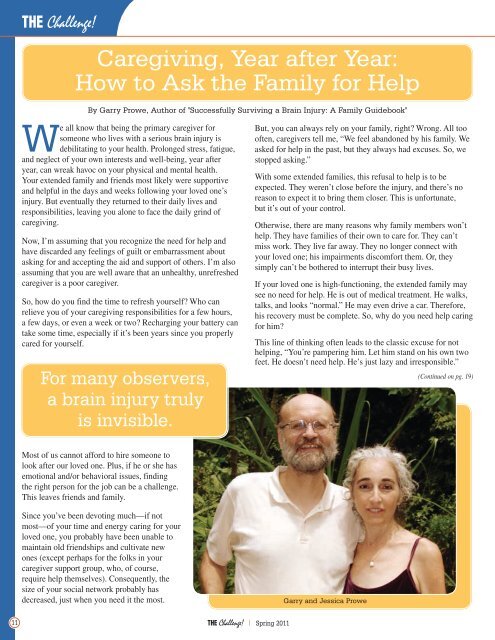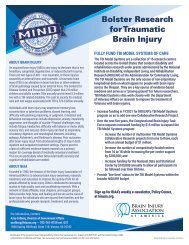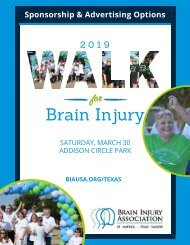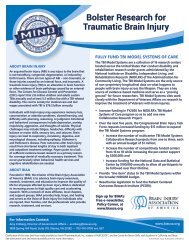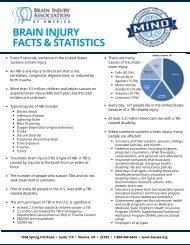THE Challenge! Spring 2011
Communication
Communication
Create successful ePaper yourself
Turn your PDF publications into a flip-book with our unique Google optimized e-Paper software.
<strong>THE</strong> <strong>Challenge</strong>!<br />
Caregiving, Year after Year:<br />
How to Ask the Family for Help<br />
By Garry Prowe, Author of "Successfully Surviving a Brain Injury: A Family Guidebook"<br />
We all know that being the primary caregiver for<br />
someone who lives with a serious brain injury is<br />
debilitating to your health. Prolonged stress, fatigue,<br />
and neglect of your own interests and well-being, year after<br />
year, can wreak havoc on your physical and mental health.<br />
Your extended family and friends most likely were supportive<br />
and helpful in the days and weeks following your loved one’s<br />
injury. But eventually they returned to their daily lives and<br />
responsibilities, leaving you alone to face the daily grind of<br />
caregiving.<br />
Now, I’m assuming that you recognize the need for help and<br />
have discarded any feelings of guilt or embarrassment about<br />
asking for and accepting the aid and support of others. I’m also<br />
assuming that you are well aware that an unhealthy, unrefreshed<br />
caregiver is a poor caregiver.<br />
So, how do you find the time to refresh yourself? Who can<br />
relieve you of your caregiving responsibilities for a few hours,<br />
a few days, or even a week or two? Recharging your battery can<br />
take some time, especially if it’s been years since you properly<br />
cared for yourself.<br />
For many observers,<br />
a brain injury truly<br />
is invisible.<br />
But, you can always rely on your family, right? Wrong. All too<br />
often, caregivers tell me, “We feel abandoned by his family. We<br />
asked for help in the past, but they always had excuses. So, we<br />
stopped asking.”<br />
With some extended families, this refusal to help is to be<br />
expected. They weren’t close before the injury, and there’s no<br />
reason to expect it to bring them closer. This is unfortunate,<br />
but it’s out of your control.<br />
Otherwise, there are many reasons why family members won’t<br />
help. They have families of their own to care for. They can’t<br />
miss work. They live far away. They no longer connect with<br />
your loved one; his impairments discomfort them. Or, they<br />
simply can’t be bothered to interrupt their busy lives.<br />
If your loved one is high-functioning, the extended family may<br />
see no need for help. He is out of medical treatment. He walks,<br />
talks, and looks “normal.” He may even drive a car. Therefore,<br />
his recovery must be complete. So, why do you need help caring<br />
for him?<br />
This line of thinking often leads to the classic excuse for not<br />
helping, “You’re pampering him. Let him stand on his own two<br />
feet. He doesn’t need help. He’s just lazy and irresponsible.”<br />
(Continued on pg. 19)<br />
Most of us cannot afford to hire someone to<br />
look after our loved one. Plus, if he or she has<br />
emotional and/or behavioral issues, finding<br />
the right person for the job can be a challenge.<br />
This leaves friends and family.<br />
Since you’ve been devoting much—if not<br />
most—of your time and energy caring for your<br />
loved one, you probably have been unable to<br />
maintain old friendships and cultivate new<br />
ones (except perhaps for the folks in your<br />
caregiver support group, who, of course,<br />
require help themselves). Consequently, the<br />
size of your social network probably has<br />
decreased, just when you need it the most.<br />
Garry and Jessica Prowe<br />
11<br />
<strong>THE</strong> <strong>Challenge</strong>! | <strong>Spring</strong> <strong>2011</strong>


